How Plunge Went From Garage Prototype to $80+ Million DTC Brand in Under 4 Years
They ship 2k+ units per month, have built an elite influencer network, and see ~7-10x ROAS... All without raising a dime of VC
.png)
Have you ever heard of the health benefits of cold plunging?
Of course you have.
You've probably got at least one friend these days who won't stop talking about it. And if you don't, it's likely because you are that friend to someone else.
Either way, if you're the kind of person who reads this website, then you're probably also the kind of person who's come across one of Plunge's sleek white tubs – either tucked neatly into a back yard, or gracing the Instagram feeds of people like Rich Roll, Rhonda Patrick, and the rest.
You may not know their incredible story though.
Plunge co-founders Michael Garrett and Ryan Duey are both Hampton members. And in this piece, they break down their journey, from launching out of a garage in the middle of the pandemic, to building their influencer program, and scaling to over $80 million in sales. A wild ride for a company that's still less than four years old.
My favorite part: The influencer gifting + road-show concept that eventually led them to the doorsteps of people like Tony Hawk, Andrew Huberman, and more.
Hello! Who are you and what business did you start?
Michael: Hey, I'm Michael Garrett, co-founder & co-CEO of Plunge. I invented the Plunge when COVID closed my float tank business. I coaxed Ryan to start selling cold plunges DTC with me back in August of 2020. I handle anything on the product side of things.
Ryan: I'm Ryan Duey, co-founder and co-CEO of Plunge. Fast-forward to today, we're shipping over 2,000 units a month from a 150,000-square-foot facility in Lincoln, CA. We haven’t raised a dollar and are on pace to hit $80-90 million in sales this year.
Michael: We’ve built the brand on affordable, yet beautiful cold plunges through influencer marketing. We've also expanded our product line to include saunas, made in-house, and have just launched an all-new, fully integrated cold plunge model called the Plunge All-In.
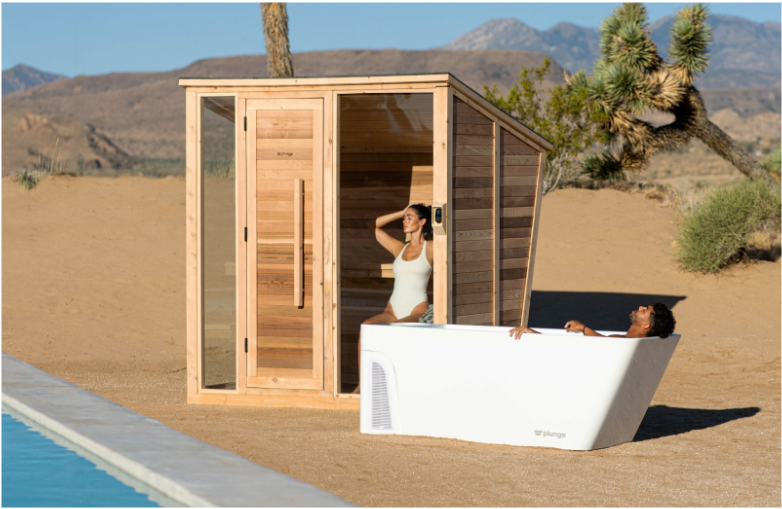
What's your backstory and how did you come up with the idea?
Michael: I still remember the day Ryan walked into my newly-opened Reboot Float Spa in San Francisco. He was starting Capitol Floats in Sacramento and we both had eerily similar journeys. We both had recently returned from transformative experiences backpacking in Thailand and drinking ayahuasca in South America.
Ryan: Mike and I immediately hit it off and became fast friends. We went to festivals like Burning Man together and also launched a successful charity fundraiser so got a taste of working together. Fast forward to March of 2020, and COVID-19 hit the planet.
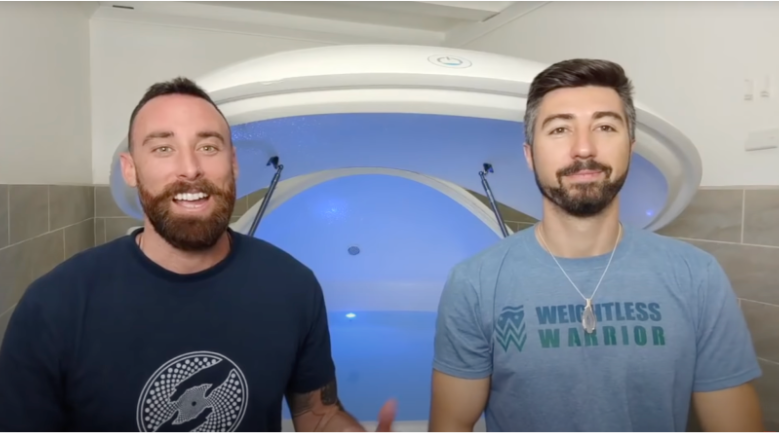
Michael: After coming to grips with the fact that my business would be closed for months, I decided I needed a project to help add value to the float spa.
I had been doing sauna/cold plunge for years so I wanted to add the service. When I looked to see what cold plunges were for sale, nothing was compelling. Everything was $10k+ and looked pretty rugged, so I saw a hole in the market.
I started building prototypes in my garage and after a bunch of iterations, I added it to the spa.
Then, I emailed my customer base to see if anyone was interested in me building them one and I sold two units really quickly. That’s when I thought this could be a business and asked Ryan to join up.
Ryan: I actually said no at first. To be honest, the beta units were a little rough.
To his credit, I came back a month later and he had dramatically improved the design. He asked me again and I agreed.
We agreed to do a limited sale of 20, almost like our own little Kickstarter.
I remember it vividly, we launched the site and sent an email to our float center email lists and instantly got a sale. I was out in my RV (Which I was living in at the time) with my buddy and showed him. We both looked at each other and knew we might be onto something.
Take us through the process of building and launching the first version of your product.
Michael: My original design was to create a custom integrated product. I was doing CAD drawings and I had calls with a bunch of R&D firms, but it was super expensive and had no funding.
Next, I thought about Kickstarter to raise the funds, but that sounded like a huge headache.
Finally, I decided to pivot and just create an MVP in my garage. I googled “freestanding acrylic bathtub” and the first result turned out to be local! Just a 30-minute drive from me in Sacramento.
I picked up a damaged tub for $100, put it in my camper van and took it home. I attached a water chiller, an aquarium pump, and a water filter to the back of the tub. I then put all the electrical equipment inside a box, bolted it all to the back of a tub, and voila - that was the first Plunge!
I sold two beta versions before Ryan came on. We cleaned up the design and have been iterating it ever since.
We have a ton of different versions of the plunge because we kept changing and improving it, which has been hard for our customer service team, but has really helped the product. We launched super fast, but knew that if someone’s product had an issue, we’d do whatever it took to make it right.
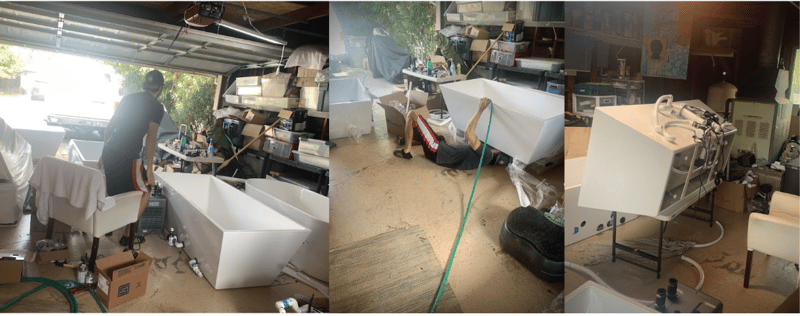
Since launch, what growth channels have been most effective for you?
Ryan: We started by emailing our existing customer bases and friend networks. That sold us the first 20.
We bought thecoldplunge.com for $10 on GoDaddy and shot up google organic search ranking to the first page in 2 months.
The search term “cold plunge” was a wasteland back in late 2020. The verdict was still out if “ice bath” or “cold plunge” would be the industry term and we went all-in on cold plunge. The decision was a massive win early on.
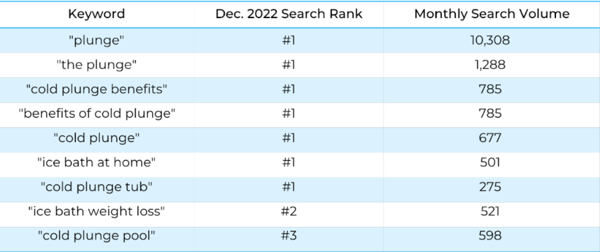
Michael: The next big win we got was from influencer marketing.
I was on my phone in my infrared sauna and saw Aubrey Marcus cold plunging in his ice chest freezer live on IG. I commented “We’d love to upgrade your plunge! :) Let us know if we can send one to you!”
He agreed and we immediately built him a plunge. We had no idea how to package and ship it. It was a miracle it arrived intact.
We flew into Austin to set it up and he agreed to post.
The smart thing we did was ask him to gift one to another influencer. We kept playing that game and were soon delivering plunges to Andrew Huberman and Tony Hawk.
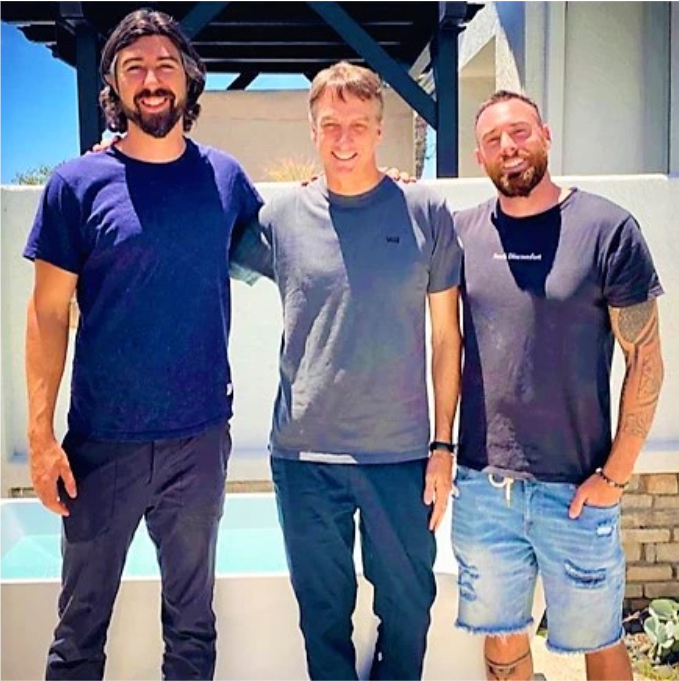
Ryan: We’d do these “plunge tours” where we’d rent a U-Haul and personally drop them off in LA and post all the content on our IG.
It seemed like we were this huge company but in reality, we had 4 employees in a 3,000 sq. foot space with no manager; 1 guy was doing both customer service and sales, 2 guys built the tubs, and 1 guy did the shipping.
Did you ever have an “oh shit” moment where you thought it wouldn’t work?
Michael: I went on a 10-day silent meditation and left Ryan to run the company. In retrospect, this sounds pretty shitty. Sorry Ryan! Things felt like they had smoothed out a bit, but it was still a skeleton crew and everything hit the fan during those 10 days.
Ryan: All good Mike. But yeah, it was a shit show.
We had 1 guy doing both customer service and sales and he gave out his personal phone number. People were hitting him up about their unit not working and he had a total breakdown.
He just walked out one day and went radio silent.
I couldn’t get into the customer service email account and our bank account started to get low. I wanted to take out a loan from Shopify but Mike was the admin.
I called my buddy Jon and asked if he could “come down to Plunge.” Jon showed up thinking I wanted to cold plunge, but I explained to him that we needed him to answer the phones and hold down the fort.
Jon was hired that day and has been a huge part of the team. He grew our inside sales team and now heads business development.
Can you break down the keys to this business model for us? What makes it work? And What do outsiders typically not understand about your industry?
Michael: The key to our early success is that we had product market fit and a huge white space. No one was at our $5k price point and we were all over social media.
Ryan: The key to us scaling was being DTC, so we get full margin from the customer up front and we’ve typically had a lead time of 8 weeks, so our customers' orders funded the business’ growth.
We have finally got the lead time down, which is much better for our customers, our cancellation rate, and our internal team, but is much tougher on cash flow.
Michael: Our Google and FB ads got over 10x immediately. I hired a guy from Upwork in Portugal early on to run our Google ads. He had been doing it for over a decade and said had never seen anything like our 10X ROAS. We still rock over 7x ROAS on our paid media and 9x ROAS overall.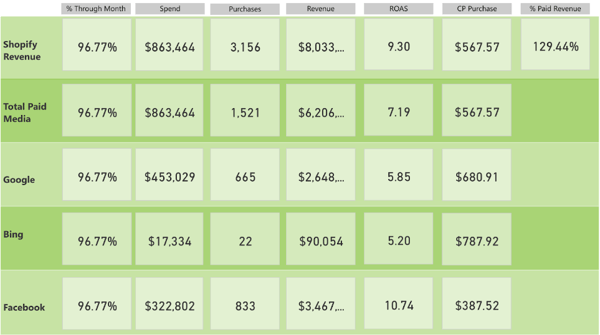
What platform/tools are absolutely crucial for your business?
Michael: Shopify was indispensable. Everyone knows this now, but they handle everything: payment processing, web hosting, drag and drop web dev, analytics, etc. I made the website myself for the first year plus. Early on, we even took out one of their loans; with 1-click we borrowed hundreds of thousands of dollars. Incredible.
What have been the most influential books, podcasts, or other resources?
Ryan:
-
Pods: MFM, How I built this, Fall of Civilizations, Anthology of Heroes
-
Books: Let My People Go Surfing, Building a Story Brand, The 4-Hour Workweek
-
Resources: Hampton, Intro the app, Investment Bankers, Ayahuasca, EOS, Landmark Education
Michael: I’ll share about one that’s a bit controversial; Landmark Education. It’s a seminar for personal growth. Some people think it’s a cult, but it’s not.
You are in a room all day Friday through Sunday with 100 strangers talking about your life, so it’s a bit weird. Among other things, you learn the limiting stories you told yourself when you were young and that it’s all made up so you can create whatever possibility you want for your life.
It had a huge impact on my mind and gave me the confidence to create things in the world.
I introduced it to Ryan about a year after we met. He took to it and shared it with his whole family.
It’s a shared language and operating system we have that keeps us from getting caught in stories and keeps us connected to what we’re committed to. It’s very helpful for anyone trying to understand their mind and relate to reality in a powerful way.
We still pay for anyone in the company that wants to go through it.
Where do you see untapped opportunity in the market? What business do you wish someone else would build that would make your job easier?
Ryan: The positive impact on your health when you cold plunge & sauna is insane. There is good research out there showing 5x in norepinephrine, dopamine, and endorphins, but it would be amazing if you could see biomarkers in real-time in an app like you can with blood sugar. I think the data would be mind-blowing and convince the mainstream to get into it.
What are some strong opinions you have about leadership, and how do you actually put those into practice in your company?
Michael: We’ve had friends get in early and run departments, but we’ve grown so fast that the growth of the business has exceeded the learning curve.
It’s a typical story. We’ve been successful at hiring VPs to manage them, and framed it in a way where they see them as a mentor.
Successfully framing it that way for them has allowed them to grow instead of feeling like they have failed or are being demoted.
Ryan: I like to lead with encouragement. I’m a carrot as opposed to a stick guy, meaning I am big on highlighting and congratulating people when they succeed and aligning incentives for everyone involved.
We have a company value of “ All Boats Rise.” It has a number of meanings behind it but one of the big ones is, I really care about seeing those who join the team leave the team better than when they started. Both personally and professionally.
We’re also super big in delegation and allowing people to own their wins and losses.
Where can we go to learn more?
Michael: Plunge.com and @plunge on IG.
Ryan: You can follow me at @ryanaduey on IG and listen to my podcast called “The Journey with Ryan Duey”
Personally, I find being the CEO of a startup to be downright exhilarating. But, as I'm sure you well know, it can also be a bit lonely and stressful at times, too.
Because, let's be honest, if you're the kind of person with the guts to actually launch and run a startup, then you can bet everyone will always be asking you a thousand questions, expecting you to have all the right answers -- all the time.
And that's okay! Navigating this kind of pressure is the job.
But what about all the difficult questions that you have as you reach each new level of growth and success? For tax questions, you have an accountant. For legal, your attorney. And for tech. your dev team.
This is where Hampton comes in.
Hampton's a private and highly vetted network for high-growth founders and CEOs.





